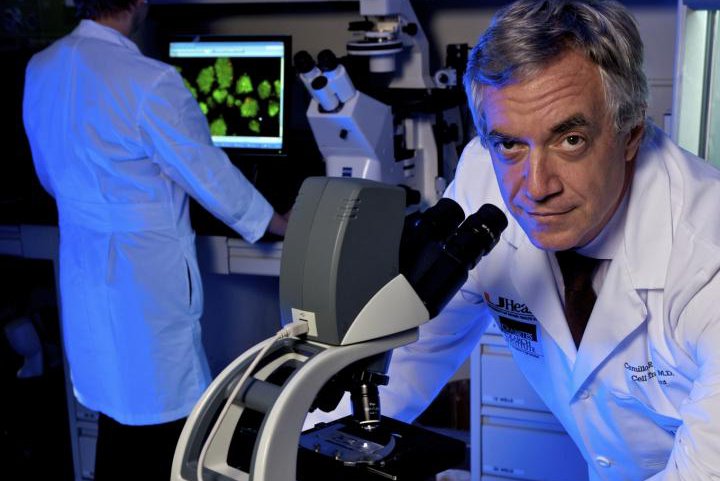
January 05, 2021
 Courtesy/University of Miami Health System
Courtesy/University of Miami Health System
Dr. Camillo Ricordi, director of the Diabetes Research Institute and Cell Transplant Center at the University of Miami, has been investigating how umbilical cord stem cells affect the immune response for more than 10 years.
Patients hospitalized with severe cases of COVID-19 may benefit from infusions of stem cells derived from umbilical cords, University of Miami researchers say.
Data from a small, randomized controlled trial suggests that infusions reduce the risk of death and accelerate recovery for the sickest COVID-19 patients.
In the trial, 24 COVID-19 patients hospitalized with severe acute respiratory distress syndrome received either two infusions of 100 million stem cells within three days or infusions of a placebo.
Acute respiratory distress syndrome is a serious COVID-19 complication that results from severe inflammation and fluid buildup in the lungs. Most affected patients need some sort of organ support.
Patient survival at one month was 91% in the stem cell group and 42% in the placebo group, researchers found.
Among the patients younger than 85 years old, 100% of those treated with stems cells had survived at the one-month mark. Researchers also reported that the treatment was safe, with no adverse infusion-related events.
Recovery also was faster among patients in the stem cell group. More than half of them had recovered enough to be discharged from the hospital within two weeks after their last treatment. More than 80% of the stem cell group had recovered in a month compared with 37% in the placebo group.
Mesenchymal stem cells not only can modulate immune system response, but they also have antimicrobial activity and can promote tissue regeneration, said senior author Dr. Camillo Ricordi, director of the Diabetes Research Institute and Cell Transplant Center at the University of Miami.
His team, along with collaborators in China, have been studying their use in treating type 1 diabetes for more than 10 years. A single umbilical cord can provide therapeutic doses for over 10,000 patients.
"These cells have clearly inhibited the 'cytokine storm', a hallmark of severe COVID-19," added Giacomo Lanzoni, lead author and assistant research professor at the Diabetes Research Institute. "The results are critically important not only for COVID-19, but also for other diseases characterized by aberrant and hyperinflammatory immune responses, such as autoimmune type 1 diabetes."
Mesenchymal stem cells can be really effective at treating COVID-19 because they naturally migrate to the lungs when given intravenously, Ricordi said. It is a more complicated process for type 1 diabetes, however, as the infusion must take place in specific arteries to ensure the cells go directly to the pancreas.
It is important to note that this trial on COVID-19 patients was very small, so more research will be needed to confirm the efficacy of the study. Earlier studies in China also have shown positive results with this type of treatment for COVID-19 patients, but there was widespread skepticism over the results because none of the studies were randomized with a control group.
Ricordi and his team will next investigate whether stem cell treatment can reduce progression of disease in COVID-19 patients who haven't yet become severely ill, but who are at risk intubation.
The findings were published in STEM CELLS Translational Medicine.